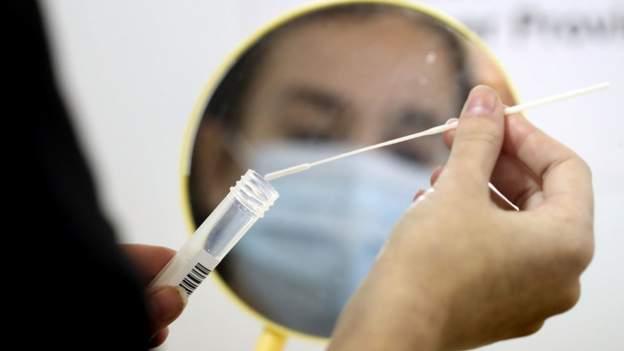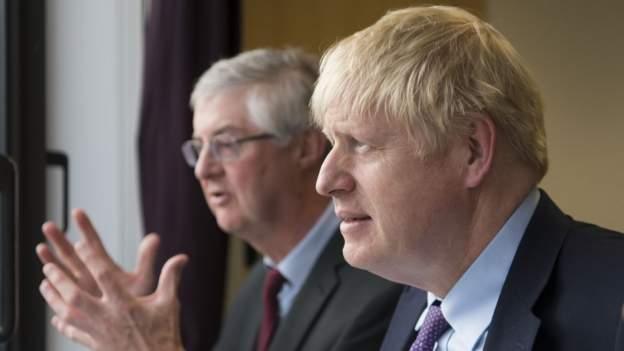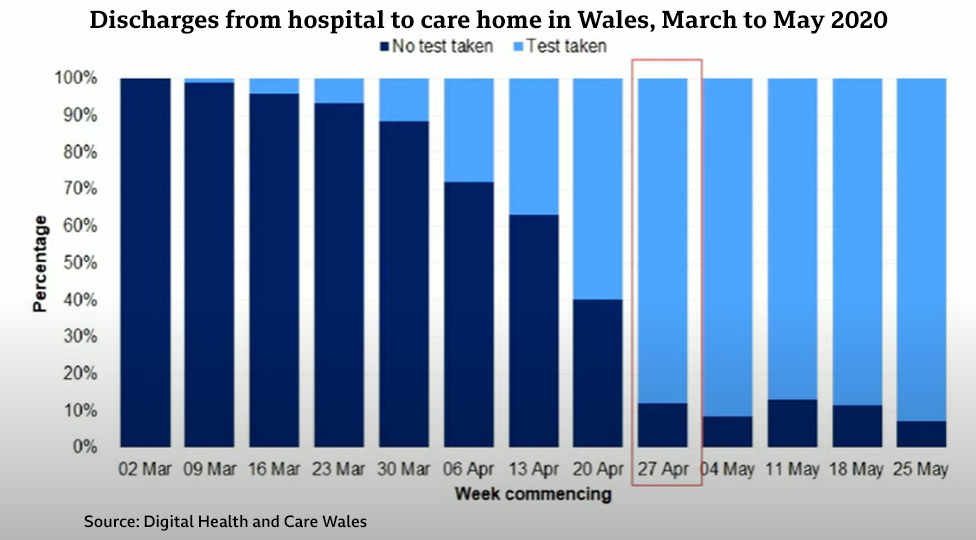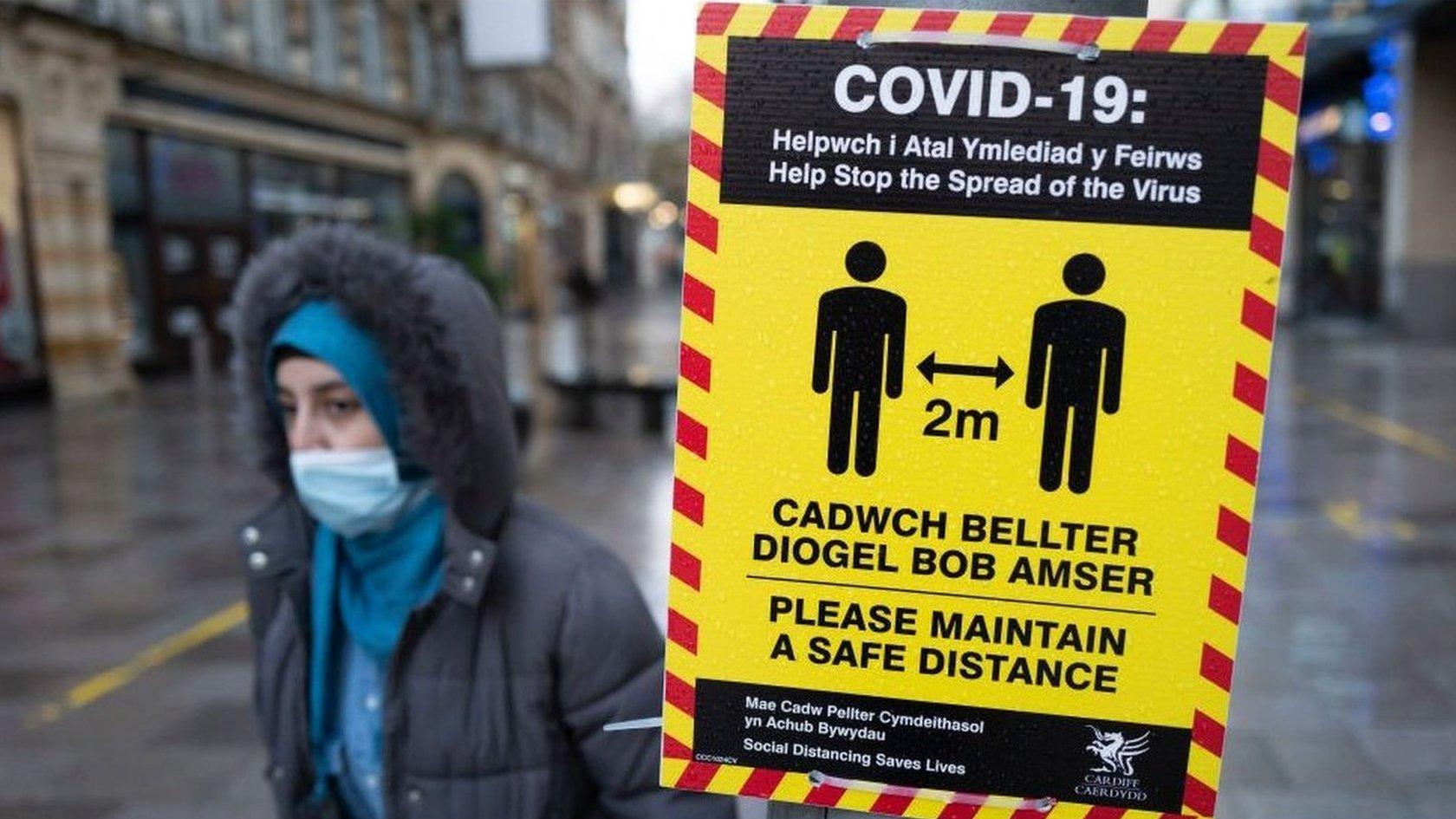Covid: Scientist's doubts over Wales care home test delay
- Published

A change to testing rules for care home admittance came in on April 27 2020, but 47 patients were discharged without one after that date
First Minister Mark Drakeford's claim there was "no value" in Covid testing all care home residents was queried by a top scientist, an inquiry has heard.
Mr Drakeford made the comment in a TV news interview on 29 April 2020.
The Welsh government's head of science asked for the "rationale, evidence and advice" behind this the following day.
Day three of the Covid inquiry in Wales also heard more than 75% of residents who died from Covid after hospital stays were not tested before discharge.
In the interview, Mr Drakeford said: "The clinical evidence tells us that there is no value in [testing everyone] and because of that we don't do it."
At that stage all care home residents in England were being offered tests, but in Wales they were only available for those with symptoms.
In an email to senior officials on 30 April 2020, Robert Hoyle, the Welsh government's head of science, said he was "keen to understand the rationale, evidence and advice behind the first minister's comments last night on the telly that there is no value to testing for CV19 in care homes."
"Please can you enlighten us," he said.
Testing for care home residents and staff in Wales, regardless of whether they had symptoms, was not announced until the 16 May 2020.
Data shared with the inquiry showed 1,729 hospital patients were discharged into care homes between the start of March and end of May 2020.
By the end of June, 81 had died from Covid, most of whom were not tested.
Dr Hoyle added that Wales' chief scientific adviser "could and should have done more" when Covid first emerged and the Welsh government needed Boris Johnson's "decisive leadership".

The Welsh government's head of science called into question Mark Drakeford's stance on care home testing and said Wales needed Boris Johnson's "decisive leadership"
Mass testing of hospital patients being transferred to care homes in Wales was introduced from 27 April 2020, two weeks later than in England, but there were still 47 patients not tested after this date.
Twenty-nine of those were in the Aneurin Bevan health board area, according to the data.
Stephanie Howarth, chief statistician for Wales, said there could have been instances when there were reporting issues, but it "could be because genuinely that no test was undertaken".
The inquiry was told Wales had the highest number of Covid deaths across the UK in the second wave of the pandemic.
Prof Sir Ian Diamond, chief executive of the UK Statistics Authority, took the inquiry through the mortality figures involving Covid in Wales.
England had the higher percentage of excess expected deaths (11.9%) - the difference between the number of deaths recorded for a specific place and time and the number of deaths that would have been expected anyway - compared to Wales (9.2%) in the pandemic period up to February 2022.
But there were 3,187 excess deaths in the second wave in Wales, and 4,429 deaths involving Covid, compared to 2,251 excess deaths in the first wave and 2,109 deaths involving Covid.

Dr Hoyle said there was "a lack of confidence" by Welsh ministers around what action to take in early 2020.
He added he believed lockdown was inevitable, but that quicker action could have reduced fatalities in the first wave.
"Despite what the prime minister did subsequently during the Covid-19 crisis, I have to admit that, in my view, he did act decisively on behalf of the whole of the UK... and Welsh ministers needed that decisive UK-wide decision making and leadership," he said.
Dr Hoyle said he started monitoring Covid after it emerged in China in December 2019, but he did not start discussing Covid with the chief scientific advisor for Wales, Prof Peter Halligan, until a week before lockdown.
He said Prof Halligan implied "that it was someone else's problem… a health issue".
"I went out of my way to encourage him to engage with this, he eventually took that advice but not until very late in the day. I think he could and should have done more," he said.

Analysis from Gareth Lewis, BBC Wales political editor
The Welsh government's policy around the testing and discharge of hospital patients into care homes is becoming the recurring theme of this module of the inquiry.
Bereaved families have long wanted answers on why Wales introduced such testing a fortnight later than England.
The data shown to the inquiry that some patients might still have been discharged without a test a whole month after the guidance changed will have been difficult reading for them.
The key decision makers - including First Minister Mark Drakeford and Health Minister at the time, Vaughan Gething, will give evidence the week after next.
Today's hearing also gave an insight into what was going on behind the scenes before the first lockdown - from a Welsh government that found out only late in the day that it would be in charge to scientists disagreeing about how quickly action should be taken.

'Confusion over accountability'
Meanwhile, Mr Drakeford admitted he learned Wales would take charge of its own Covid response only three days before the UK-wide lockdown was introduced.
The lockdown was announced on 23 March by Boris Johnson, who was then prime minister, and who used public health powers rather than civil contingencies legislation to do so, because it had been advised it could not use the former as Covid was not an unforeseen event.
This meant the Welsh government ended up in charge of decision-making in Wales, the inquiry heard.
Tom Poole, the inquiry counsel, said that once the decision had been made Drakeford agreed with the approach as it allowed him to "calibrate" a response specific to Wales.
Prof Dan Wincott, an expert in Welsh government decision-making, said "blame games" were played between the Welsh and UK governments , describing them as a "feature of the system".
He said the "jagged edges" of the devolution settlement led to "confusion over accountability", adding: "Welsh ministers are still responsible for decisions, but exercise those responsibilities in particularly tight and uncertain constraints."
Prof Wincott said that structures to help the Welsh and UK governments work together were "much less well-developed than would be optimal in a system like the UK".

INSEPARABLE SISTERS: The seven-year-old conjoined twins who defied all odds
JUNE: VOICE OF A SILENT TWIN: The tragic story of June, her sister and their life in Broadmoor

- Published28 February 2024

- Published27 February 2024

- Published28 May 2024
